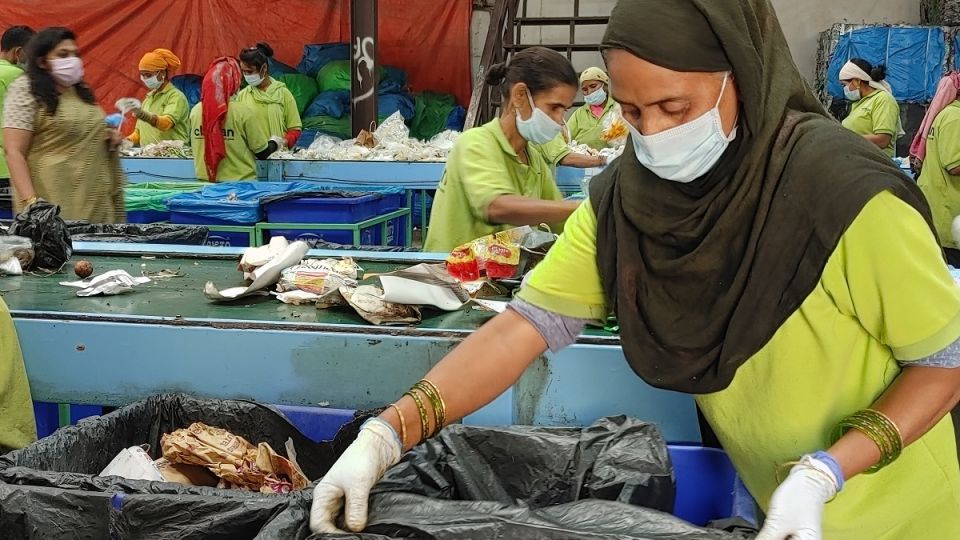May 12, 2022
NEW DELHI – An integrated waste management infrastructure, which includes setting up of Material Recovery and Segregation Facilities (MRFs), enabling rag pickers or waste pickers to get a job opportunity and to live life with dignity in the national capital.
The Coca-Cola India Foundation’s Integrated Waste Management Solutions in partnership with Chintan drives social initiatives and helps people to earn a livelihood at Chara Mandi, near the Zakhira flyover in the Capital.
The initiative made the informal waste sector into a formal one, raising awareness of source segregation, influencing attitudinal changes in waste disposal, and protection of natural habitats among others.
Inadequate source segregation is one of the major roadblocks that hinders recycling.
Burning of unsorted solid waste can also aggravate air pollution.
One of the workers Gauri told The Statesman how she was able to contribute income for her family as earlier she used to pick wastes and merely getting Rs 50 to 100 for working the whole day but now she is employed with the Chintan and getting a good amount to run his family.
Chintan Founder & Director Bharati Chaturvedi said, “Partnerships are key for development and programs which include waste pickers are key to the burgeoning waste crisis and creating a sustainable recycling value chain.
The project provides an opportunity for The Coca-Cola India Foundation and Chintan to collaboratively further the Government of India’s vision of creating a Swachh Bharat. Our semi-automated material recovery facility in partnership with the North Delhi Municipal Corporation enables us to “hyper segregate” and focus on the new low-value waste. It is a real-life educational experience which conveys the message of sustainable living very impactfully through such self-sustaining projects.”
Devyani Rajya Laxmi Rana, Vice President – Public Affairs, Communications and Sustainability for Coca-Cola India and Southwest Asia said, “Furthering the company’s global vision of creating a World Without Waste, we are proud to collaborate with like-minded organizations for developing sustainable waste management solutions. Our journey with Chintan for setting up Material Recovery and Segregation Facilities to promote inclusive, sustainable, and equitable growth signals a renewed focus on sustainable waste management. The programme employs 80% of women waste-workers, which enables us to promote women empowerment, improve livelihoods and ensure social-security and dignity of labour.”
With this initiative, Chintan, an NGO, has created a 360-degree model for waste management and also aims at transforming the way society looks at waste. Through this project it not only works on waste management but also improves the livelihoods and quality of life of rag pickers who are engaged in this project and provide them with social security and dignity.
The project aims to demonstrate a self-sustainable waste management module for all stakeholders. It includes:
· Partner with North Delhi Municipal Corporation and bulk waste generators to divert at least 7 tonnes of waste daily from the landfill. The project is spread over an area of 7,000 square feet
· Divert 60% of wet waste generated from households ending up at landfills
· Divert waste, especially PET which forms almost 10% of the dry waste, to authorized recyclers. Create wealth for the waste pickers engaged in the initiative and upcycle few key identified materials
· Create a best-in-class self-sustaining project to showcase the journey of waste from collection to segregation and further recycling
With this initiative the project also approaching it as follows:
a) Create awareness amongst RWAs and other bulk waste generators: Workshops to ensure capacity building of RWAs and bulk waste generators to understand waste and the impact of waste segregation, management and recycling. Key stakeholders and opinion leaders will be empowered to lead the process for long-term sustainability.
b) Livelihood for waste pickers: Waste pickers can earn additionally by selling the compost generated or by being paid for their work. Moreover, improved recycling will mean additional income for them.
c) Use existing waste collectors and volunteers: Under the partnership project, identification and training of local waste pickers/waste collectors for awareness on segregation and composting, to ensure improved livelihoods and build on their existing knowledge of waste. This will empower them to be a part of the solution and ensure project sustainability. Volunteers from the RWAs will be trained to manage the project.
d) Wet-waste composting: A wet waste composting has been set up at the Material Recovery facility and certain local communities as well. Currently, almost 100% of the wet waste goes to landfills. Due to this intervention, less than 20% of the wet waste will reach landfills in the target households, impacting air pollution. This will also create additional income for the waste pickers, who will either be paid for additional work or be helped by Chintan to sell the compost.
Almost all developing countries face a solid waste crisis, are producing more trash and often overlook the contributions of waste pickers, a group of 20 million persons found all over the developing world.
The MRF is a model that requires only an initial investment, waste and tested training, which enables waste pickers to run an MRF on their own. It is premised on the following globally occurring conditions — that PET plastic, paper and cardboard sell well, that composting can be done in a compact area, that everywhere there are waste pickers, and that children also pick trash.


